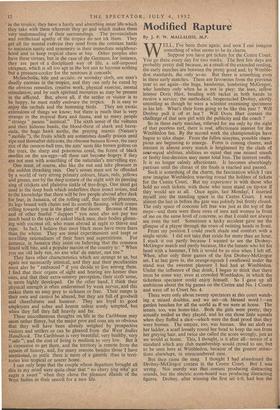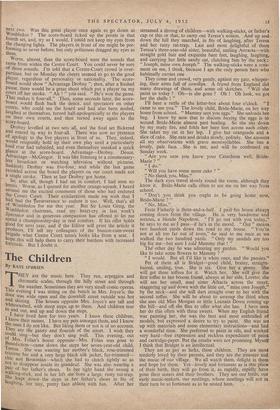Modified Rapttu4
By J. P. W. MALLALIEU, M.P.
WELL, I've been there again; and now I can imagine something of what seems to be its charm. Suppose you have got tickets for the Centre Court. You go there every day for two weeks. The first few days are probably pretty dull because, as a result of the extended seeding, the early matches are between the pretty good and, by Wimble- don standards, the only so-so. But there is something even in these early matches. There are favourites from the previous year to see again—the huge, handsome, lumbering McGregor, who lumbers only when he is not in play; the lean, sallow intense Doris Hart, bending with racket in both hands to receive a service; the methodical, bespectacled Drobny, alertly unsmiling as though he were a scientist examining specimens in his lab. What's their form going to be like this. year ? Will Drobny pull it off at last ? Will Doris Hart contain the challenge of that new girl with the publicity and the coach ? .
So in these early matches, relieved for me only by the sight of that peerless turf, there is real, affectionate interest for the Wimbledon fan. By the second week the championships have begun to take, shape. From the fallen ninepins, possible cham- pions are beginning to emerge. Form is coming clearer, and interest in almost every match is heightened by the clash of near-equal abilities, abilities so equal that one missed smash or faulty line-decision may mean total loss. The interest swells. It is no longer calmly affectionate. It becomes absorbingly partisan until the climax of the finals is reached and passed.
Such is something of the charm, the fascination which I can now imagine Wimbledon weaving round the holders of tickets for the Centre Court. But my experience is with those who hold no such tickets, with those who must stand on tip-toe if they would see at all. Once again, last Monday'', I inserted myself into the standing space in the Centre Court. I was almost the last in before the gate was politely but firmly closed. The only space of concrete left free was just at the top of the steps—and there were three rows of men and women in front of me on the same level of concrete, so that I could not always see even the turf. Sometimes a lucky accident gave me the glimpse of a player through the rows of twisting heads in front.
From my position I could reach shade and comfort with a single stride. I did not take that stride for more than an hour. I stuck it out partly because I wanted to see the Drobny- McGregor match and partly because, like the lunatic who hit his head with a hammer, I felt it would be so nice when I left off. When, after only three games of the first Drobny-McGregor set, I at last gave in, the orange-squash I swallowed under the stand was the sweetest pleasure I had had at Wimbledon. Under the influence of that drink, I began to think that there must be some way, even at crowded Wimbledon, in which the ticketless spectator could enjoy himself. So I gave up all ambitions about the big games on the Centre and No. 1 Courts and went off to Court No. 4.
There were only about twenty spectators at this court watch- ing a mixed doubles, and we sat—oh blessed word ! —on garden benches for all the world as if we were at home. The tennis, too, was home-like. Both the girls were pretty; they actually smiled as they played, and let out those little squeals when they fluffed a shot—which were the final proof that they were human.. The umpire, too, was human. She sat aloft on her ladder, a scarf loosely round her head to keep the sun from her greying hair, and twice she called the score wrongly, just as we would at home. This, I thought, is it after all—tennis of a standard which any club membership would crowd to see, but to be seen here at Wimbledon, because of the greater attrac- tions elsewhere, in unencumbered ease.
But then came the snag. I thought I had abandoned the Drobny-McGregor contest in the Centre Court. But 1 was wrong. Not merely was that contest producing distracting sounds, but the electric score-board was producing distracting figures. Drobny, after winning the first sit 6-0, had lost the next two. Was this great player once again to_ go down at Wimbledon ? The score-board ticked up the points in that fourth set, and, try as I would, I could not keep my eyes from the changing lights. The players in front of me might be per- forming as never before, but only politeness dragged my eyes to them.
Worse, almost, than the score-board were the sounds that came from within the Centre Court. You could never be' sure of those sounds. I'm told that a Centre-Court crowd is over- partisan, but on Monday the cheers seemed to go to the good player, regardless of personality or nationality. The score- board would show " Advantage Drobny "; then, after a hushed pause, there would be a great shout which put a player on my court off her stroke. " Ah ! " you said. " He's won the game. That makes it four-all." Then, some seconds later, the score- board would flash back the deuce, and spectators on other courts, who could see the board and had also been misled, laughed at themselves, turned half-apologetically to the players on their own courts, and then turned away again to the score-board.
Drobny levelled at two sets all, and the final set flickered and roared its way to four-all. There was now no pretence of apology to the live players in front of us. They, indeed, would resignedly hold up their own play until a particularly loud roar had subsided, and even themselves sneaked a quick glance at the score-board. Advantage—Drobny. Deuce. Advantage—McGregor. It was like listening to a commentary- less broadcast or watching television without pictures. Suddenly Drobny was five-four, and while the last game twinkled across the board the players on our court made not a single stroke. Then at last Drobny got home. So, after all, though I had sat in comfort, I had seen no tennis. Worse, as I queued for another orange-squash, 1 heard around me the excited comments of those who had endured the Centre Court. Their exhilaration made me wish that I had had the perseverance to endure it too. well, that's all of Wimbledon for me this year. But Sir Louis Greig, the Wimbledon chairman, read my heart-cry , in last week's Spectator and in generous compassion has offered to let me spend a championship-day in real comfort. If his offer holds good for next year, and if the Editor will print the article it produces, I'll tell my colleagues of the bunion-cum-sweat brigade what Centre Court tennis looks like from a seat. I hope, this will help them to carry their burdens with increased fortitude. But I doubt it.



























































 Previous page
Previous page